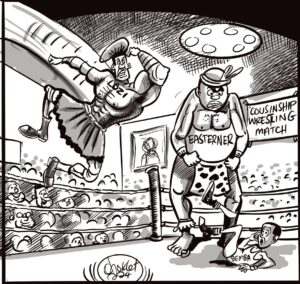The United States government department of African Bureau of International Narcotics and Law (INL) Enforcement Affairs says criminals generate about $40 billion every year from environmental crimes in Africa.
And the INL department says Zambia will benefit from $50 million which it has been allocated to combat wildlife trafficking on the African continent.
Speaking during a telephonic press conference from Washington D.C yesterday, INL Deputy Assistant Secretary Dan Foote said illegal wildlife products were among the top four lucrative trafficked goods in the region.
Foote told journalists that the US government was making efforts to halt wildlife trafficking adding that the crime restricted economic development, security, and undermined the rule of law.
Foote also disclosed the United States and China, which happened to be the biggest demand countries in the world for illegally-trafficked wildlife products, had signed an agreement to end legal markets in most illicit wildlife.
“Last year, the United States and China, who happen to be the two biggest demand countries in the world for illegally-trafficked wildlife products, signed an agreement to end legal markets in most illicit wildlife. China plans to fully enforce its ban on ivory and other wildlife products by the end of this year, the United States has done the same. I attended a huge ivory crush of several tons in New York City a few weeks ago to show the amount that we’ve seized here in the United States. We’ve also seen major efforts and decreases in demand across Southeast Asia, which are also high-demand countries, such as Laos, Vietnam, Cambodia, etc. So that has had a big impact on demand, and as a result, we’ve seen prices go down. We’ve also seen many successes on the supply side, which I’ve been speaking about here today, with impressive seizures, huge ivory crushes and burns in Kenya, in Vietnam, in San Diego, and, as I mentioned, in New York. We’re now beginning to see a lot more prosecution, so I am cautiously optimistic that we’ve reached a tipping point and we’re starting to really have a positive impact on this terrible scourge,” Foote said.
“Wildlife trafficking has devastating impacts on ecosystems and societies: it pushes iconic species to the brink of extinction, restricts economic development, threatens security, and undermines the rule of law. Throughout Africa, we’ve seen that this criminal trade fuels corruption and is linked to armed groups that create instability. Unfortunately, wildlife trafficking is often viewed solely as a conservation issue. It isn’t. The truth is that wildlife trafficking is also a serious crime, and often a violent one, which fattens the wallets of transnational criminal syndicates. Illegal wildlife products are among the top four most lucrative trafficked goods and the trade is estimated at tens of billions of dollars annually.”
He said that through various trainings, the department would partner with African nations in order to improve their enforcement, investigative, prosecutorial, and legislative capacities, and cooperation within and across governments.
“The State Department’s Bureau of International Narcotics and Law Enforcement Affairs, or INL, We strive to help partner nations improve their enforcement; investigative, prosecutorial, and legislative capacities; and cooperation within and across governments. To date, our training efforts have reached over 1,000 justice sector officials worldwide who combat wildlife trafficking, including conservation law enforcement officers. INL takes a criminal-justice approach to wildlife trafficking, focusing efforts around halting poaching and trafficking and lowering demand,” Foote said.
“Our work also includes cutting-edge forensics work: we support DNA forensics research on ivory seizures, which has resulted in significantly improved intelligence on ivory trafficking. This has augmented the ability of law enforcement to trace the criminal networks involved in this illicit trade. The United States government will continue to lead global efforts to end the gruesome trafficking of elephants, rhinos, and other endangered species. We stand ready to work together with more partner nations in this effort.”
He disclosed that the INL department had been allocated $50 million to combat wildlife trafficking on the African continent.
“Last year, or this year I should say, our Congress allocated to the Department of State INL $50 million to combat wildlife trafficking, of which a percentage probably slightly over 50% has been allocated towards working on the African continent. Our programs in Africa provide training and technical assistance on legal reform, investigative capacity, and building regional cooperation. We conduct regional programs to foster a transnational effort against this transnational crime, and we also oversee,” said Foote.
Foote added that the department would also embark on specific programs in Zambia and Malawi this year.
He further stated that wildlife trafficking was a crime which did not only put money in the coffers of drug trafficking organizations, but that some terrorist groups that operated across Africa derived revenues from the same crime.












